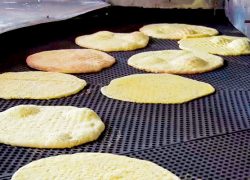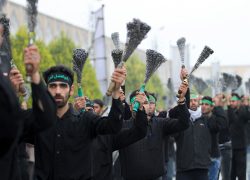Archive Isfahan

The Ceremony of Baking Nan-e Abbas Ali:
The Sacred Bread
The ceremony of baking nan-e Abbas Ali (Abbas Ali bread) has been held since about 200 years ago in Aran va Bidgol County, especially in its desert areas.

The Isfahan School of Comedy Theatre:
Laugh and Live Better!
The Isfahan School of Comedy Theatre offers ways to achieve a better life by addressing local customs and traditions, and criticising ugliness and anomalies to correct wrong behaviours and appreciate morals, using a humorous language.

Chowgan:
King of the Games!
Chowgan is a cultural, artistic and sports event, which has a strong connection with the identity and history of its participants and its audience.

The Art of Making and Playing the Ney of Isfahan:
Listen to the Reed How It Tells a Tale…
Early March is the best time to cut and dry the smooth and hollow stems of the plant reed, out of which ney is made.

Sefidshahr's
Legacy of Camel Singing!
If you visit Sefidshahr, be sure to ask about “the Camel’s Tale” from the elderly of the region and listen to a long and melodic narration.

Badroud's Carpet-Weaving Songs:
Carpet-Weaving Orchestra!
Most often a number of songs about pattern reading as well as some rhythmic poems are sung by women during the process of carpet weaving.

The Gazi Dialect: A Lasting Part of Iranian Heritage
Sweet as the Sound of Gaz
The Gazi dialect belonging to the group of Central Plateau Dialects is an ancient Iranian dialect, which has managed to survive in Gaz-e Borkhar.

Save the Meyma'i Dialect:
The Endangered Eastern Dialect
The local dialect spoken in Meymeh County, Isfahan Province, is one of the rare dialects of the Pahlavi language, whose signs can be seen nowhere else in this county except in the words uttered by middle-aged and elderly men and women of the region.

Isfahan's Heritage: The Ilchi Mosque
A Mosque for the Ambassador’s Daughter
The Ilchi Mosque was founded at the request of Hakim Nezam ul-Din Mohammad Ilchi’s daughter, Saheb Soltan Beygom.

The Figures of Isfahan: Hossein Hamedanian
The Far-Sighted Entrepreneur
Touba Garden reminds the people of Isfahan of Hossein Hamedanian, the renowned entrepreneur and philanthropist of Isfahan, who is buried in the garden’s grounds.

Isfahan's Heritage: Shah-Dej Castle
The Honourable Lady
The lady, clad in the finest and most magnificent clothes and jewellery, threw herself down from the top of the castle in order not to be captured by the besiegers!

Isfahan's Heritage: Sheikh Bahaei Hammam
The Mysterious Bath and Its Candle!
Lots of interesting stories have been told about Sheikh Bahaei Public Bath; but the one that is more famous than all others is the story of its candle, the candle that never went out.






